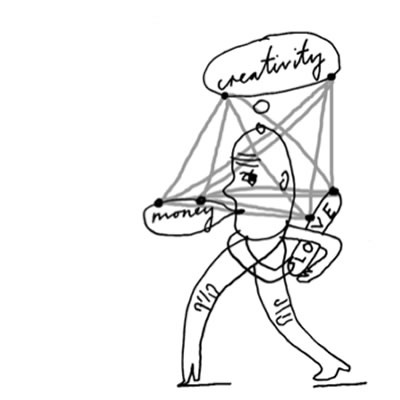First published on November 2011.
In 2005 I became Warden of Goldsmiths, University of London, a higher education institution renowned for its creative buzz, for graduates who were dynamic, imaginative and at times difficult. Many of them fit well into the creative and cultural economy. The sector skills council Skillset was establishing Media Academies, recognizing those universities that prepared students for the media and film industries. Initially, I struggled with Skillset’s conception of what constituted skills – which made it difficult for Goldsmiths to qualify. We got the impression that we had too much theory and not enough practice, even though the Goldsmiths programmes had plenty of both. So began a period of discussion about what was the relationship between skills, education and employability in the creative industries. It was a constructive debate, in which industry leaders as much as academics and Skillset engaged. We came to understand each other, and the conception of skills became wider, embracing a longer-term vision of what was needed.
Here is an employer-led organisation moving beyond a narrowly-defined sense of ‘skills’. Although my focus in this piece is on skills for creativity, it is about the distinctiveness of the UK graduate and applies across the economy. The difficulty that many in higher education have is not with preparing students for future employability – though we prepare them for a great deal more than that – but with a skills agenda under successive governments that has narrowed the concept of skills to something akin to training. It is as if the skills of university graduates are like those delivered lower down the education system, but with harder sums. It is a misguided discourse that fails to see the real ways in which education contributes to economic success.
The discourse on skills seems entirely short-term. A few years ago I organised a seminar for Universities UK on longer-term thinking about the ‘strategic subjects’ employers might need. I couldn’t find a large employer to tell us how they predicted the subjects in which they’d need graduates in five years time, but found one who told us that he had no idea what they’d need in five years so could they please have bright, imaginative graduates who could think in both a creative and rigorous way. More recently, Geoff Scott, Director of Research & Venturing at BT, observed of the IT sector that it ‘is characterised by rapidly changing skills requirements. Particular technologies may well be defunct within a relatively short period of time. HE’s focus should be on developing young people with the ability to rapidly assimilate knowledge and develop competence on what will be an ever-changing suite of technologies that they will encounter during their careers.’
We are educating graduates for jobs that haven’t yet been invented, and that is especially true for the digital and creative economy. If we’d asked media industry employers in 2000 what skills they needed, how many would have said ‘digital content’ or ‘interactive media’ ? The most forward-thinking, perhaps, but not many. Graduates from intellectually demanding media degrees in that year would, however, have the flexibility and understanding to adapt as new opportunities came along. This is the distinctiveness of the UK graduate. They are more likely to be innovative in ways not constrained by rigid disciplinary or cultural frames of reference.
Anyone who has taught in many other European systems, as I have in France, will recognise the difference, and the comparison with the educational approaches in the Middle and Far East is even more striking. It is developed by personal contact between students and academic staff, by research-informed teaching, nowadays by social learning environments that build on traditions of student interaction, and by a curriculum that encourages critical engagement with established knowledge.
On a recent visit to Hong Kong I discussed the major educational reforms now being implemented –four-year degree programmes, a wider curriculum that crossed science/arts boundaries, more critical and imaginative engagement with knowledge – and saw how other knowledge economies understood what they lacked. As I said to people there, it is easier to change educational structures and curriculum than to change the culture of learning. Our approach to university education is more conducive to creativity than that in many other countries. There is a danger that in pursuing a narrowly-conceived skills agenda the UK will willfully abandon its competitive advantage.
None of this is specifically about the creative economy, but it is about imagination, flexibility and challenge, which go together in education in the subjects which feed that creative economy. This includes configuring thought and disciplines in new ways, and in encounters with other students and other practitioners. In this it parallels the social interaction and exchange, the co-production of knowledge, that characterises so much research practice. It is the ability to learn, exchange and adapt that is crucial to the creative economy, now, tomorrow and in the future. It includes entrepreneurship, the ability to couple imagination with an ability to understand and model risk. We can call all of this skills, but they are skills that come from education, not training.
There is nothing wrong with skills other than the meaning policy-makers generally attach to them. It is through that narrowing of vision by which skills becomes about training rather than education, about security rather than risk, about the known rather than the unknown, that the strength of the creative economy will be undermined.
 Creativity Money Love: Learning for the 21st Century by Creative & Cultural Skills is licensed under a Creative Commons Attribution-NonCommercial-NoDerivs 3.0 Unported License.
Creativity Money Love: Learning for the 21st Century by Creative & Cultural Skills is licensed under a Creative Commons Attribution-NonCommercial-NoDerivs 3.0 Unported License.
Illustrations by Paul Davis - http://copyrightdavis.blogspot.com/


